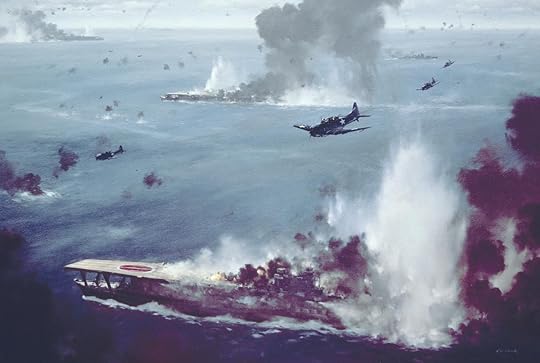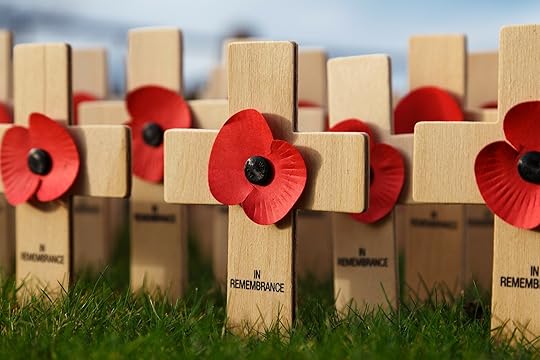Jim Wilson's Blog, page 43
November 29, 2021
Let This Mind Be in You

The following is a ministry letter written by my wife Bessie in 1974:
The way up is down. The way down is up. Contradiction, paradox, or simple truth? In Luke 14, at the conclusion of a parable about taking the place of honor, Jesus said, “For everyone who exalts himself will be humbled, and everyone who humbles himself will be exalted.”
Jesus came to the same conclusion in Luke 18 after telling the story of two men who prayed in the temple, “I tell you this man went down to his house justified rather than the other, for everyone who exalts himself will be humbled, but he who humbles himself will be exalted.”
In the second parable, the first man thanked God that he was not an extortioner, unjust, or an adulterer, that he tithed, and that he fasted twice a week. Jesus did not say that it was not true! What was wrong? He also thanked God that “he was not like other men, or even like this tax collector.” He exalted himself.
The other man was bad, and he admitted it. Jesus did not say that it was not true, either. What was right? He humbled himself.
Humility is apparently a character thought and act independent of, and senior to, any other merit of right or wrong. The first man could have humbled himself, and the second man could have exalted himself.
We have a supreme example of self-exaltation in the Bible. It was Satan himself, and it was his way down. “How art thou fallen from heaven, O Lucifer, son of the morning…for thou hast said in thine heart, ‘I will ascend into heaven, I will exalt my throne above the stars of God’” (Isaiah 14:12-13).
And we have the supreme example of humility in the Bible. It was Jesus, and it was the way up. “Have this mind among yourselves, which you have in Christ Jesus, who, though he was in the form of God, did not count equality with God a thing to he grasped, but emptied himself, taking the form of a servant, being born in the likeness of men. And being found in human form, he humbled himself and became obedient unto death, even death on a cross. Therefore God has highly exalted him and bestowed on him the name which is above every name” (Philippians 2:6-9).
In every encounter we have, with God or man, whether we are aware of it or not, we have one or the other of these attitudes. We follow Satan in exalting himself, or we follow Jesus in humbling himself.
Christ, in glory with the Father, did not insist that His rightful place in Heaven was more important than humbling Himself. It wasn’t! When He was an innocent man on earth, He did not protest His innocence. He humbled Himself still further and died for our sins. He made Himself of no reputation. Humbling Himself was more important to Him than His equality with God, His reputation, His innocence.
The same paragraph in Philippians says, “Let this mind be in you which was also in Christ Jesus.” If we allow this mind to be in us, then our “rightful place,” our reputation, and our innocence is not as important as humbling ourselves. How can this be? Jesus said in Matthew 11:28-30, “Take my yoke upon you and learn of Me, for I am meek and lowly in heart.”
When you pray for the Wilsons, please make your prayer along the line of this meditation. We want to be like Him, and He tells us this is the way.
- Bessie WilsonHow To Be Free From Bitterness and other essays on Christian relationshipsNovember 26, 2021
Reconciled, Holy, Free

“But now He has reconciled you by Christ’s physical body through death to present you holy in His sight, without blemish and free from accusation—if you continue in your faith, established and firm, not moved from the hope held out in the gospel” (Colossians 1:22-23).
Wonderful phrases these: holy in His sight; without blemish; free from accusation. This is in contrast to the phrases in the preceding sentence: alienated from God; enemies in your minds; evil behavior.
This is what reconciliation means. It changes our relationship with God. The change is not minimal like from strangers to friends, but is overwhelming, i.e., “alienated from God” to “holy in His sight”; similarly, from “enemies in your minds” to “without blemish” and from “evil behavior” to “free from accusation.”
Let us praise Him for His grace.
This post coordinates with today's reading in the To the Word! Bible Reading Challenge. If you are not in a daily reading plan, please join us at TotheWord.com. We would love to have you reading with us.
How To Be Free From Bitterness and other essays on Christian relationships
November 25, 2021
Happy Thanksgiving!
November 22, 2021
Trials & Joy, Poverty & Generosity

“And now, brothers, we want you to know about the grace that God has given the Macedonian churches. Out of the most severe trial, their overflowing joy and their extreme poverty welled up in rich generosity. For I testify that they gave as much as they were able, and even beyond their ability. Entirely on their own, they urgently pleaded with us for the privilege of sharing in this service to the saints. And they did not do as we expected, but they gave themselves first to the Lord and then to us in keeping with God’s will” (2 Cor. 8:1–5).
We do not usually think of severe trials and overflowing joy going together. Nor do expect extreme poverty to well up in rich generosity. Another unusual image here is Paul’s description of how the Macedonians “urgently pleaded with us for the privilege of sharing in this service to the saints.” This is refreshing to read after getting so many letters “urgently pleading with us” to give.
In this passage, Paul teaches the Corinthians the importance of giving from the heart. He teaches them to give for their own good and for the good of the people to whom they give. He was collecting money as well as teaching, but he was collecting for the needs of others, not for himself or for his own ministry.
“For God so loved the world that He gave… (Jn. 3:16).
“I am not commanding you, but I want to test the sincerity of your love by comparing it with the earnestness of others. For you know the grace of our Lord Jesus Christ, that though he was rich, yet for your sakes he became poor, so that you through his poverty might become rich” (2 Cor. 8:8–9).
Giving is a gracious work and an essential component of sincere love. Do you give your time? Do you give your home in hospitality? Do you give your possessions? Do you give your resources? Would you give your life? If your answer is, “I don’t have the time, or a home, or money,” those are not valid excuses.
“For if the willingness is there, the gift is acceptable according to what one has, not according to what he does not have” (2 Cor. 8:12).
If you are willing, you may find yourself welling up in rich generosity, even in your poverty.
*Excerpted from Being Christian. To purchase, visit ccmbooks.org/bookstore.
How To Be Free From Bitterness and other essays on Christian relationshipsNovember 19, 2021
Just Good Enough to Keep Sodom Around

God’s kind of righteousness has a positive effect on society. “You are the salt of the earth” (Matt. 5:13), and “You are the light of the world” (Matt. 5:14).
Righteousness is not to be ineffective. Salt that does not have the characteristics of salt is good for nothing. Light that is hidden is not light. Men do not praise God for bad deeds in the lives of Christians.
There are two events in biblical history which take this truth to two opposite extremes.
One is the destruction of Sodom, and the other is the minor defeat of Israel at Ai. The stories are found in Genesis 18-19 and Joshua 6-7. God had promised the safety of a very wicked city if ten righteous people were found in it. In the other case, God allowed the defeat of a righteous nation by a wicked city because there was one unrighteous man in the camp. Thirty-six other men were killed because of this man’s unrighteousness.
I think that these are not opposite principles, but only opposite effects of the same principle. God will spare a wicked city if there is an adequate righteous witness in it. However, God will not give victoryunless there are all righteous people in the camp. We as Christians have settled for the first. We are content with minimum light, just enough to keep the Sodoms of the world from being destroyed. We are not willing to purge the unrighteousness in ourselves and in the church in order to take the Ais of this world with the gospel of our Lord Jesus Christ.
One is a defensive view, and the other is an offensive view. We, the church, who, like Joshua, should have an offensive view, have endeavored to spread the gospel with unrighteous men in the army. The Lord is not with us for victory.
It is not enough that we increase our methods of war if the Lord is not with us for victory. We in the Christian church need all of our men and women walking in the light as He is in the light. Would you ask God to show you if there is any unconfessed, unforsaken sin in your life? Then confess and forsake it.
How To Be Free From Bitterness and other essays on Christian relationshipsNovember 17, 2021
Our Preeminent Lord

In the many years I have been in the ministry, I have seen a series of different ideas sweep across the church. Some of them I participated in, and some of them I only observed. Each time this has happened, it sounded as if this particular teaching was the final answer. Here are a few of them: the indigenous church, small group Bible studies, one on one discipleship, city-wide crusades, the gifts of the Spirit, the local church, shepherds, discipleship; with bigger buildings and bigger congregations. I have strong opinions on most of these, but that is not the issue. The issue is that most of these have been means, and they have been treated as ends.
In Colossians l:13-22, Paul speaks of the work of Christ in redemption and creation, “that in everything he might be preeminent.” Rather than focusing on having the perfect church, methods, gifts, or eschatology, we should seek our preeminent Lord.
“Let the hearts of those who seek the Lord rejoice! Seek the Lord and his strength, seek his presence continually” (Psalm 105:3-4).
“One thing have I asked of the Lord, that will I seek after; that I may dwell in the house of the Lord all the days of my life, to behold the beauty of the Lord, and to inquire in his temple” (Psalm 27:4).
“Thou hast said, ‘Seek ye my face.’ My heart says to thee, ‘Thy face, Lord, do I seek’” (Psalm 27:8).
All other things are secondary.
This post coordinates with tomorrow's reading in the To the Word! Bible Reading Challenge. If you are not in a daily reading plan, please join us at TotheWord.com. We would love to have you reading with us.
How To Be Free From Bitterness and other essays on Christian relationships
November 12, 2021
Principles of War: Security, part 3

One way to keep from being attacked would be to keep no company with the wicked. But 1 Corinthians 5:10 tells us that “then must ye needs go out of the world.” Jesus prayed to the Father, “not that thou shouldest take them out of the world, but that thou shouldest keep them from the evil” (John 17:15). It is His will that we be exposed to attack but not defeated. Our divinely ordered armor provides effective security.
Lt. General William K. Harrison, Jr., in a message given in Yokosuka, Japan, drew attention to Romans 13:12–14, which says, “Let us put on the armour of light,” and, “Put ye on the Lord Jesus Christ, and make not provision for the flesh, to fulfill the lusts thereof.” This indicates, General Harrison said, that in putting on the armor of Ephesians 6 we are putting on Jesus Christ. He is the truth (John 14:6). He is our righteousness (1 Cor. 1:30). He is the author and finisher of our faith (Heb. 12:2). He is the gospel (Mark 1:1). He is our salvation (Exod. 15:2), and He is the Word (John 1:1).
In physical war, if a nation were continually under attack and on the defensive, we could prophesy ultimate defeat, surrender, or destruction. To prevent this, there must be a final stand. The initiative and the offensive must change hands before victory can come to the defenders. This stand is called the defensive-offensive.
In World War II, there were four main turning points that gave the offensive to the Allies. All of these were great defensive-offensive battles where the defenders won and afterward took the initiative. Two of them have already been described in brief. The first battle of Alamein at the Alam Halfa ridge turned the tide in North Africa (as briefly described in chapter three). The Battle of Midway mentioned earlier was the defensive-offensive battle that reversed the positions in the Central Pacific. In Europe, the crown for defensive-offensive strategy goes to the Russians in the Battle of Stalingrad. When it became clear that the city would not fall, the Germans should have called a retreat. This was not done, and the German Sixth Army was annihilated. The fourth was the defense of Port Moresby in New Guinea that resulted in the annihilation of the Japanese detachment at Buna.
If there is no turning point, the defender will be defeated. There will be no turning unless a stand is made in a defensive-offensive battle. Yet, seemingly, in the minds of many Christians, a defensive position in the spiritual life is considered a virtue and an offensive position a sin. Defense is associated with the innocent party, as though we expect only the wicked to take up the offense. For this reason the virtuous pride themselves on being defenders, instead of taking up the offensive for truth, justice, holiness, and a powerful personal witness. This sometimes results in the pathetic situation of the virtuous enjoying defeat. Let us never forget that without an eventual offensive, defense only anticipates ultimate defeat.
The defensive-offensive applies to both individuals and groups of believers. Have you been only a defender against sin and sinners? Perhaps it is time for a stand, a defensive-offensive.
“Therefore stand,” and thus make your security sure.
*Excerpted from Principles of War. To purchase, visit ccmbooks.org/bookstore.
How To Be Free From Bitterness and other essays on Christian relationshipsNovember 11, 2021
How To Be Free From Bitterness and other essays on ...
November 10, 2021
Principles of War: Security, part 2

Our intelligence of Satan permits us to set up defenses. Ephesians 6:10–17 describes this defense, with the reasons for each part of our “armor.” Before we put on the armor we must be strong in the Lord’s strength and power (v. 10). Verses 11–13 put the emphasis upon the whole of the armor, and 14–18 speak of the separate parts of the armor and their uses.
Our combatants are not flesh and blood but “principalities,” “powers,” “rulers of the darkness of this world,” “spiritual wickedness in high places” (v. 12), and they are masterminded by the devil himself (v. 11). Like any wise general, Satan will not attack a strong point if weak points are available for a breakthrough. He is a good strategist. We need not fear his strength so much as his “wiles” (v. 11). The Scripture tells us twice to put on the whole armor of God so there will be no weak points.
A wall around a city may be strictly defensive, but armor by definition is not. Webster’s Collegiate Dictionary says of armor: “that conceived of as an offensive or defensive weapon.” A soldier does not cover himself with armor because he intends to read a good book in front of his fireplace. He is going off to battle. He has every intention of going into harm’s way. He is looking for and expecting a fight. Sun Tzu said, “The good fighters of old first put themselves beyond the possibility of defeat and then waited for an opportunity of defeating the enemy” [Sun Tzu, The Art of War, ed. Thomas R. Phillips, trans. Lionel Giles (Harrisburg: The Military Service Publ. Co., 1949), Chapter IV].
The Christian warrior who obeys Ephesians 6 has done just this. This soldier employs the various parts of the armor to put himself beyond the possibility of defeat. He surrounds himself with truth, he puts on the breast plate of righteousness, he takes the shield of faith, and he dons his helmet of salvation. Then with the power of the Lord, the preparation of the gospel of peace, and the sword of the Spirit, he defeats the enemy.
The Coalition forces were very well protected in the war with Iraq. Each soldier had a gas mask and effective protective clothing. We Christians have been issued protective clothing, but we do not put it on. We are hurt and harmed by weapons that should bounce off or be quenched by our defensive clothing. Not only are we walking wounded, but we think that this is normal and wonder about Christians who are under attack and not wounded. But it is not normal to go into battle half naked. It is not normal to be wounded all the time.
If the great objective assigned to us by Jesus Christ is to “preach the gospel to every creature,” then the smallest whole number of that objective is one single person. Each individual, like the rest of his fellows, is an enemy of God in his mind by wicked works (Col. 1:21). We are surrounded by these enemies. We read their literature, hear their conversation, and participate in their community. In effect, the prince of this world and his servants are taking the offensive against the saints continually.
(To be continued on Friday...)
*Excerpted from Principles of War. To purchase, visit ccmbooks.org/bookstore.
How To Be Free From Bitterness and other essays on Christian relationships
November 9, 2021
Principles of War: Security, part 1

The art of entrenchment . . . shall serve the defender not to defend himself more securely behind a rampart, but to attack the enemy more successfully.
—Carl von Clausewitz, Principles of War
Finally, my brethren, be strong in the Lord, and in the power of his might. Put on the whole armour of God, that ye may be able to stand against the wiles of the devil. For we wrestle not against flesh and blood, but against principalities, against powers, against the rulers of the darkness of this world, against spiritual wickedness in high places.
—The Apostle Paul, Ephesians 6:10–12
Security may be divided into three parts: 1) intelligence of the enemy, 2) continual protection against the enemy, and 3) a final stand against the enemy. Before we can be secure from attacks by an enemy, we must know there is an enemy. The nation that has no enemy is very secure. The nation that has an enemy but does not think so is very insecure. That nation could be surprised, completely unprotected.
Intelligence of an enemy ensures knowing who he is, his intentions, and his methods of operating. This prevents deception and surprise. In physical warfare, this intelligence is gained by listening to everything the enemy says and reading everything he writes. Since the enemy does not want his opponent listening in on everything he says, he establishes safeguards: fences, guards, soundproof rooms, security checks to expose spies or traitors, and encryption of his radio, telephone, and internet communications. In order to gain this intelligence, the opponent sends in spies, breaks down fences, steals safes, bribes or kills guards, taps telephone wires, and practices cryptanalysis. Thus, to be secure from the enemy, one must gain access to his communications while safeguarding all of one’s own communications.
In the early months after Pearl Harbor, our carriers were operating in the Southwest Pacific, our battleships were out of action, and the Japanese were moving a three-pronged strike and invasion fleet toward Midway Island and the Aleutian Chain. There would have been no stopping this force if it had not been for our intelligence of the enemy. Through cryptanalysis, the U.S. Navy cracked the Japanese code and moved more planes, submarines, and carriers to Midway. The Japanese lost four carriers to air action, while we lost one carrier and one destroyer. This, the turning point of the war in the Pacific, illustrates the absolute necessity of intelligence of the enemy to ensuring security.
So it is in spiritual war. Our enemy is Satan. We must know who he is, what he does, his intentions, and his methods. We can read his history in the Bible and observe his victories and defeats in his actions with men. We can also read of his contact with the Son of God, his failure in the temptation in the wilderness, and his defeat at Calvary.
At present there seems to be among Christians an inordinate, almost insatiable desire to be informed about cults, the occult, and new age movements. Although we are not to be ignorant of Satan or his devices, we are not to fill up our heads and hearts with foul, evil untruths.
“I would have you wise as to what is good and guileless as to what is evil; then the God of peace will soon crush Satan under your feet” (Rom. 16:19–20). We find that Satan is neither omnipotent nor omniscient, and that he has very definite limitations. Apparently through ignorance of God’s “plan of attack,” Satan perpetrated the crucifixion of the Lord Jesus Christ by blinding the religious and political leaders of two thousand years ago. The Bible says, “None of the princes of this world knew [the wisdom of God]: for had they known it, they would not have crucified the Lord of glory” (1 Cor. 2:8). This failure of Satan to discern God’s plan was a factor in his defeat, for through the cross God wrests men from Satan’s grasp and enlists them into His eternal kingdom.
We are neither omnipotent nor omniscient, but we have access to a power and knowledge of which Satan knows nothing. Christ has revealed to us the wisdom of God, though it is “hidden” from the world. He also endows us with His power. Christ said to the apostles: “All power is given unto me. Therefore go” (Matt. 28:18–19).
There are many things Satan does not know and cannot do. Let us find out his strengths and weaknesses, “Lest,” as Paul says in 2 Corinthians 2:11, “Satan should get an advantage of us: for we are not ignorant of his devices.” Let us discover the information that is the key to our spiritual security.
(To be continued tomorrow...)*Excerpted from Principles of War. To purchase, visit ccmbooks.org/bookstore.
How To Be Free From Bitterness and other essays on Christian relationships




